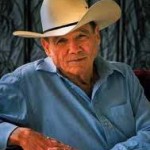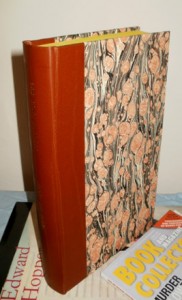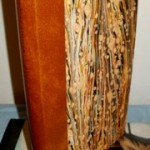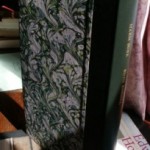James Lee Burke, The Glass Rainbow
£70.00
When it comes to literate and violent motifs in a major detective series James Lee Burke has few peers. For more than two decades the Dave Robicheaux detective series has blossomed and each of the recent novels have been lauded by the critics. Burke is a major force in American crime. This novel, set in Louisiana, is partly about the real-life murder case of seven females and partly about the deception that Robicheaux uncovers in the oil industry. This edition contains a lovely appreciation by Irish crime writer John Connolly.
Out of Stock

 Following early attempts at literary fiction and a thriller issued by a university press James Lee Burke found a niche with the Dave Robicheaux detective novel Neon Rain (1987). It was this breakthrough that quickly earned him an Edgar for best mystery with Black Cherry Blues, his third novel in the series. This book, like the others in the series is about a deep feeling for the South, human dignity and redemption. What Burke brings to the genre is an emotional engagement; listen to this: “. . . I had found the edge. The place where you unstrap all your fastenings to the earth, to what you are what you have been, where you flame out on the edge of the spheres, and the sun and moon become eclipsed and the world below is as dead and remote and without interest as if it were glazed with ice. ”
Following early attempts at literary fiction and a thriller issued by a university press James Lee Burke found a niche with the Dave Robicheaux detective novel Neon Rain (1987). It was this breakthrough that quickly earned him an Edgar for best mystery with Black Cherry Blues, his third novel in the series. This book, like the others in the series is about a deep feeling for the South, human dignity and redemption. What Burke brings to the genre is an emotional engagement; listen to this: “. . . I had found the edge. The place where you unstrap all your fastenings to the earth, to what you are what you have been, where you flame out on the edge of the spheres, and the sun and moon become eclipsed and the world below is as dead and remote and without interest as if it were glazed with ice. ”
Plotline from the authors website: James Lee Burke’s eagerly awaited new novel finds Detective Dave Robicheaux back in New Iberia, Louisiana, and embroiled in the most harrowing and dangerous case of his career. Seven young women in neighbouring Jefferson Davis Parish have been brutally murdered. While the crimes have all the telltale signs of a serial killer, the death of Bernadette Latiolais, a high school honor student, doesn’t fit: she is not the kind of hapless and marginalized victim psychopaths usually prey upon. Robicheaux and his best friend, Clete Purcel, confront Herman Stanga, a notorious pimp and crack dealer whom both men despise. When Stanga turns up dead shortly after a fierce beating by Purcel, in front of numerous witnesses, the case takes a nasty turn, and Clete’s career and life are hanging by threads over the abyss. Adding to Robicheaux’s troubles is the matter of his daughter, Alafair, on leave from Stanford Law to put the finishing touches on her novel. Her literary pursuit has led her into the arms of Kermit Abelard, celebrated novelist and scion of a once prominent Louisiana family whose fortunes are slowly sinking into the corruption of Louisiana’s subculture. Abelard’s association with bestselling ex-convict author Robert Weingart, a man who uses and discards people like Kleenex, causes Robicheaux to fear that Alafair might be destroyed by the man she loves. As his daughter seems to drift away from him, he wonders if he has become a victim of his own paranoia. But as usual, Robicheaux’s instincts are proven correct and he finds himself dealing with a level of evil that is greater than any enemy he has confronted in the past.
James Lee Burke has become the foremost American crime writer of his time. Although an entertainer Burke’s Robicheaux series (now extending to eighteen dense novels) marks out an outstanding achievement in creating a much followed flawed character with real depth and in extending the crime genre into areas of wider social concern. Recent novels, The Tin Roof Blowdown, Swan Peak and Rain Gods received ecstatic notices and with The Glass Rainbow (2010) it was the same. This Scorpion Press edition contains a lovely and considered appreciation by the highly regarded Irish crime novelist John Connolly. It comprised 75 numbered and signed copies and a further and 15 lettered for presentation purposes.

 James Lee Burke, Sunset Limited
James Lee Burke, Sunset Limited
 Ruth Rendell, Harm Done
Ruth Rendell, Harm Done

Rating by Irma Heldman in Open Letters Monthly on May 30, 2012 :
“More than once, James Lee Burke has been anointed the virtual poet laureate of southern Louisiana. William Faulkner’s name is invoked when his prose is praised. In his Dave Robicheaux novels, he is, I think, the most articulate writer of crime fiction working today. This is why a new one is cause for celebration.
The Glass Rainbow, the 18th Robicheaux novel, finds Dave back home in New Iberia, Louisiana after his sojourn to Montana in Swan Peak (2008). Dave, Cajun to the core, a Vietnam vet, and recovering alcoholic, was once part of the New Orleans Police Department. He is currently a detective with the Iberia Parish Sheriff’s Department. He lives along the Bayou Teche in New Iberia with his fourth wife Molly, a former Catholic nun, and his adopted daughter, Alafair, who is taking a semester off from Stanford Law School to finish a novel. ..” extract from the review by Irma Heldman in Open Letters Monthly on the web.
Rating by John Connelly on May 30, 2012 :
Appreciation by John Connolly
For many of my generation of mystery writers, James Lee Burke is the greatest living author in our field, and one of the most accomplished literary stylists in modern American letters. For better or worse, I would not be writing without his influence, and all that I have written, I have written in his shadow. To borrow a phrase used by Jack Nicholson of Marlon Brando: “When he dies, everybody else moves up one.”
Burke’s preeminence is due, in no small part, to the manner in which he came to the mystery novel. Before publishing, in 1987, The Neon Rain, the first book to feature the recurring character of Dave Robicheaux, he had read little in the genre, the work of Raymond Chandler and James Crumley apart, so he approached the task of writing a mystery largely freed from any obligation to the perceived requisites. The books that have emerged in the decades since are, in a sense, only incidentally mysteries: they are, first and foremost, literate, literary, socially engaged novels. To read them is to encounter a great novelist applying his gifts to a sometimes underrated form, reinventing and reinvigorating it by his presence.
On this basis alone, he deserves his place in our Pantheon, but underlying the elegance and beauty of his prose, and an engagement with the natural world that is virtually unrivalled in modern fiction, is a profound moral sensibility, one that is informed by Burke’s own personal struggles and convictions. Burke is a liberal (that much abused word, utilised as an insult by those who least understand its meaning) in the classic Steinbeck/ Dorothy Day mode, with a passionate hatred of social injustice, and a hardwired instinct to take the side of the weak and the powerless. As a consequence, compassion and empathy infuse his work, while his political and social commentary, although consistent, is carefully, and subtly, couched. For example, references to the war in Vietnam in the novels, a defining moment in Robicheaux’s past, act not only as markers to that period but as metaphors for later, dirtier conflicts, particularly those in Central America in the 1980s and early 1990s.
Equally, Burke has made no secret of his own demons: his early difficulties with alcohol, his frustration at being out of print for most of his thirties while struggling to raise a family, and the resulting bitterness that almost tipped him into nihilism. His salvation was no simple matter. Strengthened by the love and support of his wife, Pearl, he attained sobriety through the 12-step program, and rediscovered his childhood Catholicism. He also found himself published again when The Lost Get-Back Boogie, which had been under submission for nine years, and had been rejected more than a hundred times, was finally published by the Louisiana University Press in 1986.
Knowing something of Burke himself better enables us to understand how his greatest literary creation came into being. Dave Robicheaux is a complex character, both humane in his judgements, and intensely, movingly human in his failings. His intolerance of wickedness can, at times, make him seem as stern as the God of the Old Testament, but this, I suspect, is a reflection of Burke’s own belief that there are no little evils: sins, both major and minor, mortal and venial, are born of the same mother, and great wrongs grow from small seeds. As Victor Hugo once wrote, “Men become accustomed to poison by degrees”; or, as Burke himself has put it, rather more wittily, “Give the Devil an air-conditioner, and you’ll never get him out of the office.”
Yet an intolerance for evil is not the same as an unwillingness to forgive sins. Robicheaux, like his creator, is too aware of his own frailties to pass sentence rashly upon others, and, similarly, Burke is too nuanced a writer to allow Robicheaux to carry the sole moral authority in his books. Clete Purcel, his former partner, is given crucial opportunities to question Robicheaux’s occasional inflexibility, and similar criticism is permitted to be leveled at Robicheaux by the women who love and respect him. But it is also those closest to him who recognise that the person who is hardest on Robicheaux is Robicheaux himself, and such intense self-criticism, if left unchecked, can itself become a form of vanity.
Ultimately, what Robicheaux and those who act alongside him understand is the truth of the words of their creator’s namesake, the Irish writer and philosopher Edmund Burke: “All that is necessary for the triumph of evil is that good men do nothing.” To stand by while others suffer is to be complicit in their sufferings; to attempt to bring those sufferings to an end, and thus remove a little of the evil from the world, even at great cost to oneself, is an act of empathy and justice that, if one believes in God, brings us closer to the Divine and, even if one does not believe, makes one a better person for the effort.
The Robicheaux novels are one of the crowning glories of mystery fiction, and The Glass Rainbow is a worthy addition to their number. Long may Burke continue to write, for I’m in no hurry to move up that one place . . .
Rating by Colette Bancroft, The Tampa Bay Times on May 30, 2012 :
Colette Bancroft, “Tampa Bay Times”
“Ever since he began publishing his bestselling novels about Louisiana detective Dave Robicheaux back in 1987, author James Lee Burke has been writing about the natural beauty of the bayou country.
He’s also been writing about the human greed and corruption that have wreaked havoc on that beauty, so the BP oil disaster comes as no surprise to him.
“The real story goes back for decades,” Burke says. “I’ve been writing about it for decades, and so have others.”
Although Burke’s terrific new novel, The Glass Rainbow, was completed well before the disaster occurred — it was published this month — it has at its heart crimes related to the petrochemical industry that dominates Louisiana’s coast.
“It’s an allegorical story about people who traded off an Edenic paradise for short-term gain,” Burke says.
Speaking by phone from his ranch near Lolo, Mont. — he and his wife, Pearl, live there and in New Iberia., La. — Burke says he also wanted to tell a much less publicized story in this book.
“There have been eight unsolved homicides of women in Jefferson Davis Parish. They happened between 2005 and 2009 and remain unsolved.
“I was troubled by the general indifference shown them. You can Google ‘Jefferson Davis Parish homicides’ and find them; you can also see the lack of journalistic attention to them.”
The murder victims were young women of several races, some of them prostitutes or drug abusers, their bodies dumped in canals or on roadsides.
Burke says, “I was a newspaper reporter myself. I’m not criticizng the media. It’s the nature of the beast. These women were poor, they had no power.”
In The Glass Rainbow, the iconoclastic Robicheaux does care about victims like those women. He also finds himself going up against people who do have power, including Kermit Abelard, scion of a wealthy local family, who is dating Robicheaux’s daughter, Alafair.
Kermit is a novelist, and Alafair is writing her first novel. She sees a man who offers to help her get published, but Robicheaux sees a man considerably older than his daughter, a man who strikes him as predatory.
Kermit also has a close friend Dave really gets a bad vibe from: Robert Weingart, a former prisoner turned celebrity author whom Burke calls “probably one of the worst guys I ever wrote about.” But Dave’s attempts to coax Alafair out of her relationships with the two men just make her resentful.
Burke’s fans have watched Alafair grow up in the novels about Robicheaux. They may also know that one of Burke’s four children is a daughter named Alafair, a professor of law at Hofstra University who has published six mystery novels.
Burke, who is 73, says he drew on his own experience in writing about the father-daughter relationship. “Dave has all the qualms, the fears that any father has in raising a daughter.
“Any father who looks back at the time his daughter was between the ages of 13 and 17 knows he aged probably about 30, 40 years in that time.”
He quotes another of his series characters, Texas lawyer Billy Bob Holland, as saying bringing up a daughter is easy — it’s just like “being roped and drug up and down the stairs three or four times a day.”
Empire builders
Burke says that he hasn’t been back to his home in Louisiana, in the Bayou Teche area where Robicheaux also lives, since the oil began gushing. “But I’m sure it will get there. We’ll all be dealing with this for years and years.”
In The Glass Rainbow, Dave recalls the death of his father, Big Aldous Robicheaux, in a blowout preventer failure very similar to the one that sank the Deepwater Horizon rig. Burke based it on a real accident that he covered as a reporter in 1964. “We haven’t learned much,” he said.
Burke worked as a landman and pipeliner for an oil company as a young man and says he lays no blame on the people who work on the rigs and elsewhere in the oil industry. “They’re maybe the most stoic, physically brave people I’ve ever known.”
He recalls the oil workers he knew years ago: “They were like Roman legionnaires. They’d arrive on a freight train, and a couple of months later they’d all be driving Cadillacs. Then six months later they’d be dead broke.”
He laughs. “They had no last names, just initials. They were irresponsible in the best possible way. It’s like Eric Hoffa said: These were the guys who built empires.”
He does blame the people who run the empire: “BP has a long history of this kind of behavior, of being exceptionally bad about cutting corners.”
He says that since 2000, BP and other oil companies had systematically weakened regulation of their industry. “The oil industry has pulled off a tremendous coup, and we’re going to be paying for it for a long time.”
Burke says, “Their worst crime was providing misleading information to the regulatory agencies after the blowout. The figures they provided were incredibly inaccurate at a time when information was everything.”
Deception is a major theme in The Glass Rainbow, as Robicheaux and his longtime best friend, Clete Purcell, pursue the truth. It leads them and those they love to perhaps the greatest peril they’ve ever faced — and that includes fighting in Vietnam and working as homicide detectives in New Orleans.
“This book is about the end of an era; this book broods upon mortality,” Burke says.
“Going into our eighth decade, we realize we’re not any more wise. Maybe a little more patient. But we’re not doing anything differently.”
Burke says that what Robicheaux, a man so haunted by the past he has seen its spectators walk on more than one occasion, comes to realize is “there’s only one reality, and that’s today. Death doesn’t seem to be so intimidating.
“That’s about the only lesson I’ve learned.”